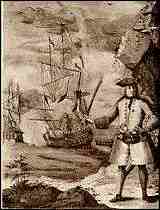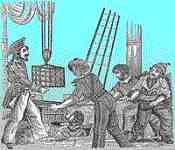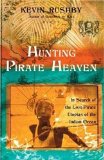More Pirate Pages
Pirate Fun
PHenry Every, Pirate Henry Every, Captain Henry Every

Interesting facts-
Henry Every supposedly offered to pay off the English national debt
in exchange for a pardon. - He once paid for provisions with a Bill of
Exchange drawn on a fictitious bank...a pirate's rubber check! - There
was even a play written about him called, The Successful Pirate.
In this article:Mutiny / Big Haul / Diappearing
Henry Every (or Avery) was born about 1653 (or perhaps as late as 1665) near Plymouth, England. He was so successful at piracy that in his day he was known as the 'Arch Pirate', and the legendary plunder of men like him and Thomas Tew caused a 'Red Sea Fever' to spread through America, the Caribbean, and England.
After an early period of unlicensed slave trading out of the Bahamas, Every was by June 1694 a first mate on the 46-gun Spanish privateer the Charles II, which was assigned to attack French smugglers on Martinique. The crew became increasingly irritated after many months of no pay, and Henry Every led a mutiny while near the Spanish town of La Coruna.
 He
was promptly elected captain of the new Fancy, which was sailed north
of Madagascar only to capture one French and three English ships, adding
many to his crew. Near Guinea, Every would lure out locals under pretense
of trade and them take them as slaves. Captain Henry Every was well established
in a career that would prove so successful, he would later be declared
outside of the Acts of Grace (beyond pardon).
He
was promptly elected captain of the new Fancy, which was sailed north
of Madagascar only to capture one French and three English ships, adding
many to his crew. Near Guinea, Every would lure out locals under pretense
of trade and them take them as slaves. Captain Henry Every was well established
in a career that would prove so successful, he would later be declared
outside of the Acts of Grace (beyond pardon).
In early 1695 while in the Red Sea, Every forged a pirate flotilla of 5 ships commanded by pirates such as Thomas Tew, William Want, Thomas Wake, and William May. With these he soon attacked the Grand Mogul's Fatah Mohammed and the larger 40-gun Gang-i-Sawai, which were busy accompanying a pilgrim fleet returning from Mecca. The Gang-i-Sawai lost its mainmast, and a cannon exploded on deck, shortening the fight and resistance. The passengers and crew were brutalized in hope that the locations of any secret stash would be revealed; some jumped ship, and some of the women committed suicide. The search yielded 600,000 Pounds in gold, silver, and jewels in one of the largest hauls ever, and each man got over 1000 Pounds, younger ones - 500.
Soon thereafter, the flotilla split up. Even some of Henry Every's crew
left, but he got slave replacements
before heading to St. Thomas and finally New
Providence. After buying protection from the Bahamian governor Nicholas
Trott and having a big party, Every and company sailed to Jamaica in
June 1695 and tried to buy a pardon from governor William Beeston for
24,000 Pounds. Beeston refused, and they went back to the Bahamas. Although
the Fancy had been given to Trott, the indifferent crew drove the tired
vessel ashore and split up. Some men went to America, and a few went
to parts unknown.
replacements
before heading to St. Thomas and finally New
Providence. After buying protection from the Bahamian governor Nicholas
Trott and having a big party, Every and company sailed to Jamaica in
June 1695 and tried to buy a pardon from governor William Beeston for
24,000 Pounds. Beeston refused, and they went back to the Bahamas. Although
the Fancy had been given to Trott, the indifferent crew drove the tired
vessel ashore and split up. Some men went to America, and a few went
to parts unknown.
Every changed his name to Benjamin Bridgeman and grouped some sloops to sail with the remaining crew to the British Isles. Lying low and acting inconspicuous was not their strong suit, and several of them were quickly caught by October 1696. Those who were not hanged were deported to the States. Every, however, disappeared after arriving in Ireland and was never heard from again. There were various reports of his being seen in Ireland, Scotland, Wales, and even on a tropical island.
Henry Every probably did more than any other pirate in influencing others to either pursue piracy or to pursue pirates. The severe reaction of the Moguls toward the East India Company jeopardized its existence and exemplified a growing anti-English, anti-European sentiment that later resulted in widespread independence movements.
"The Adventures and Exploits of Captain Avery", by Charles Ellms

